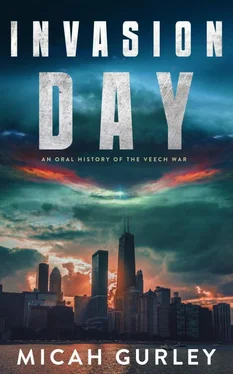The prevailing thought is that the Veech ran out of missiles. We were later told the Veech can’t make the missiles and had to buy them from another race. They’re expensive and the Veech wanted the most impact for their money. Hence the cities. They were probably going to clean up the rest of humanity through conventional means since they didn’t consider our military a threat. The Jhi told us they’d used this method before and it worked quite well.
Anyway, immediately following the strikes on the cities, those thirty-eight transports ships deployed shuttles, thousands of them, crammed full of ground troops. We call them shuttles, but they weren’t like any shuttles we were used to. They were big. About the size of a river ferry you might load cars on.
They weren’t alone. Dropping along with the shuttles were fighters. They were much smaller and sleeker, not too different from the size of our fighters. They flew around the shuttles, but like the battlecruisers in space, they never landed on Earth.
Whenever a Veech shuttle landed, hundreds of Veech would pour out in long, well-formed lines until the ship was empty. Then it would take off again and head back to its mothership. Each shuttle carried about a thousand troops. They landed roughly three million soldiers in America, with tens of millions of others dropped around the world.
In America, they deployed in Washington, D.C., Los Angeles, and Houston, all cities that had been hit. Those cities were empty of living people, making it the perfect beachhead.
We tried to contest the landing, meeting them in the skies immediately, but that didn’t end well, and they landed anyway. This went on for three days, while we sat and watched. Our fighters took a mauling, and we were scrambling about how to stop them. I’m not sure if this is true, but I heard nukes were planned. You’d have to ask someone else about that one.
On the third day, the Jhi showed up. Those of us who had access to large telescopes were able to watch quite a show, though we didn’t know what was happening. The two aliens fought in space and it seemed clear the Jhi were winning. We didn’t know what to think. Some people lost hope. An even more aggressive group of aliens? We couldn’t defend against one group of aliens, and now there were two. Others went with the whole an enemy of our enemy is our friend kind of thinking. We did know that the Veech were in trouble, and it left us with a lot of uncertainty.
The Veech got caught with their pants down, sitting stationary in space with no time to build up velocity. Most of their transports were destroyed. It was a turkey shoot. Those few that did survive made a fighting withdrawal, leaving their troops, shuttles, and fighters stranded.
What shocked us most was when the Jhi disappeared just as quickly, leaving a single Jhi destroyer to make contact.
Despite losing their space forces, the Veech ground troops and shuttles organized and consolidated and began the process of taking over the planet. They still believed they could take the Earth or that their starships would return. Whatever the case, the Battle for Earth began.
Manhattan, New York
New York is cool. The first winds of fall flow through the mostly deserted skyscrapers and alleys. The sky, a beautiful blue, is dotted with wispy white clouds, which seem suspended in the air. I walk across 5th Avenue, a few cars moving through the streets with ample room. There is very little traffic.
A few pedestrians can be seen enjoying the day, some heading into Central Park, others walking with jackets pulled tight. I enter the Metropolitan Museum of Art, its massive structure a comforting sight, despite a lack of pre-invasion crowds.
Kate Winston is waiting on a lounge chair in the reception area. She sees me and stands. Kate looks to be in her early forties, with a rigid and stern appearance. Her face is thin, almost hawkish, despite the careful application of cosmetics. She nods and starts walking.
It was a Friday, easy to remember because I was already making weekend plans. I had gotten to work late because, well, it was Friday. At that time, I was an art restorer. My job was to take old paintings and bring them back to life. I was also one of many who maintained paintings. We had some of the best restorers in the world here, as well as histories, curators, artists, designers, now… all gone.
It was almost time to go, around 2:30, I think, and a group of us were in the break room, chatting about our weekend plans and just hanging out. Tom Jenkins, an usher for the museum, ran in and told us there was an emergent announcement from the White House. We turned on the TV and there was the President. You know what he said: “Something in the skies, be patient, don’t go outside. Blah blah blah.” Some of us even started laughing. We thought it was a joke. I mean, we thought the guy was an idiot to begin with, and this was just the icing on the cake.
We made our way to the lobby and noticed… nothing. No one was making a big deal of the news. If anything, most people were excited about the alien ships. No one believed they were hostile. We were artists… optimists. People talked among themselves, some laughed. A few seemed worried and even rushed outside.
One of the historians suggested we go to the top of the building and get a good view of the aliens. Everyone agreed, but I had recieved a call about a disagreement in the basement and I needed to calm some egos. I told them I’d meet them in a few minutes and headed to the basement. The basement of MET is a few floors deep, and I went to the second floor from the bottom; it’s where a lot of the restorers, artists, and mount makers worked. It wasn’t crowded, with it being Friday and almost quitting time. I did what I had to do and got a little lost in the work. The next thing I knew, I fell to the floor, grabbing my head.
It’s hard to describe. It was more than a noise, almost like a loud screech that you could feel throughout your whole body. It’s cliché, but I felt like my head was going to explode. My entire body hurt. I couldn’t breathe. My arms and legs tightened like I was paralyzed. I lay on the basement floor, almost catatonic. It seemed to last forever, though I was told it was less than two minutes. After it ended, I lay on the ground, disoriented, weak, nauseous, and bleeding from my ears.
I made myself get up. I was alive, and I kept telling myself to get help. I wasn’t really thinking, you know, just reacting. When I finally sat up, I saw the bodies of others who had been down in the basement. A few of them were moving, but others just lay there. I didn’t panic because my thinking was so fractured, confused. I could hear a little from my right ear, but my left ear was silent. I was scared—so scared. I tried to yell for help, but I sounded like a baby kitten. I pulled myself to my feet, took a few minutes to stabilize, and drank some water. I tried to call for help, but you couldn’t get reception with cell phones. I tried the landline, but no one up top was answering. By this time, two others were up and checking on our nearby colleagues. They didn’t make it and we had to leave them there.
We got on the elevator and went upstairs and what we found… (she cries.)They were all dead. Everyone! They were just lying on the floor, blood coming from their mouths, eyes, and ears. The blood. It was everywhere.
They just fell where they were standing or sitting, just… it happened that fast. One of the guys from the basement ran outside, but I couldn’t. I just stood there. I didn’t cry, didn’t call for help. I was in shock. I don’t know how long I stood there, my brain not registering what had happened. Dead. Everyone. How could I accept it? I don’t know how long it was, but someone came, took me by the hand and sat me down. They tried to talk to me, but I couldn’t focus. I couldn’t answer. Later, they put me on a city bus. I didn’t even look at the streets, didn’t ask about where I was going. I remember fires in the city, but my memory is hazy.
Читать дальше












